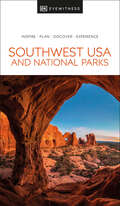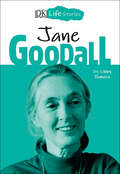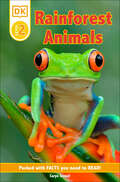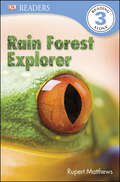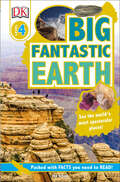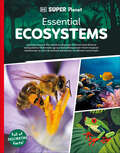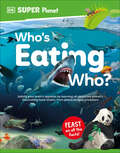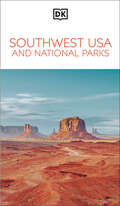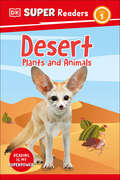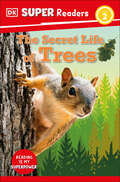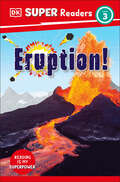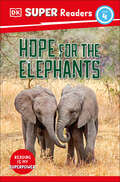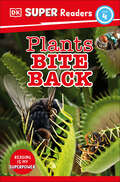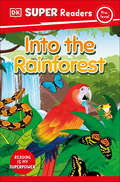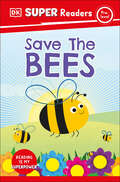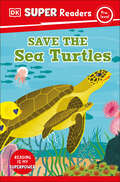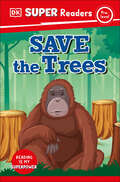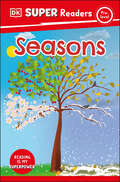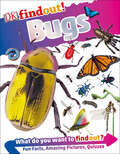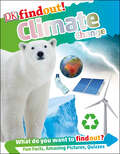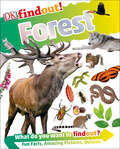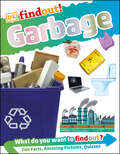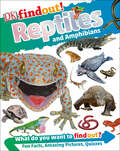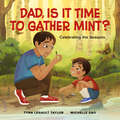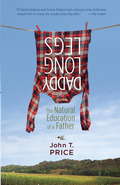- Table View
- List View
DK Eyewitness Southwest USA and National Parks (Travel Guide)
by DK EyewitnessEmbark on an outdoor adventure across the Southwest USA and its many varied and wonderful National Parks!Whether you want to unleash your inner cowboy on the ranches in Utah, take in the truly spectacular sight of the Grand Canyon, or test your luck in the casinos of Las Vegas, your DK Eyewitness travel guide makes sure you experience it all!Inside the pages of this Southwest USA and National Parks travel guide, you&’ll discover: • Our pick of Southwest USA&’s must-sees, top experiences, hidden gems, and the best spots to eat, drink, shop, and stay • Detailed maps and walks make navigating the cities and towns easy • Easy-to-follow itineraries to help you plan your trip • Expert advice and travel tips to help you get ready, get around and stay safe • Color-coded chapters to every part of Southwest USA, from the Grand Canyon, Northern Arizona, Phoenix, Southern Arizona to Southern Utah, Albuquerque, and Southern New Mexico • Available in a handy format that is lightweight and portable Find a little something for everyone down SouthIt&’s time to tick the Southwest USA off your bucket list! This updated travel guide brings this beautiful region to life, transporting you there in spectacular fashion! It&’s packed with expert-led insights, trusted travel advice, and detailed breakdowns of all the must-see sights. Stunning photographs and hand-drawn illustrations will take you through the iconic landscapes and cities of this beautiful corner of the USA.Distinguished by red sandstone mesas, cactus-studded deserts, and towering rock arches, the Southwest USA's dramatic landscapes evoke frontier legends. As rich in history and culture as natural beauty, the region's cities offer endless opportunities to experience the state's multicultural heritage.DK Eyewitness Southwest USA and National Parks have been updated regularly to make sure the information is as up-to-date as possible following the COVID-19 outbreak.Don&’t stop exploring - discover even more guides!For more than two decades, DK Eyewitness guides have helped travelers experience the world through the history, art, architecture, and culture of their destinations. Expert travel writers and researchers provide independent advice, recommendations, and reviews. Discover guidebooks to hundreds of places around the globe.Gold Award: Wanderlust Reader Travel Award 2020 in the Top Guidebook Series category.
DK Life Stories: Jane Goodall (DK Life Stories)
by Libby RomeroIn this kids' biography, discover the inspiring story of Jane Goodall, whose work with chimpanzees changed the way we understand animals and ourselves. Jane Goodall was a pioneer of primatology through her groundbreaking with chimpanzees in Africa. When she embarked on her career, women were discouraged from conducting scientific research, especially when that work meant living side by side with wild animals. Jane was a self-taught scientist, who bravely ventured out into the bush of Tanzania to discover the secret world of chimpanzees. Through perseverance and perceptive observation, she gained access to these elusive creatures and discovered that they are not so different from us. This new biography series from DK goes beyond the basic facts to tell the true life stories of history's most interesting people. Full-color photographs and hand-drawn illustrations complement thoughtfully written, age-appropriate text to create an engaging book children will enjoy reading. Definition boxes, information sidebars, maps, inspiring quotes, and other nonfiction text features add depth, and a handy reference section at the back makes this the one biography series every teacher and librarian will want to collect. Each book also includes an author's introduction letter, a glossary, and an index.
DK Reader Level 2: Packed With Facts You Need To Read! (DK Readers Level 2)
by Caryn JennerA colorful rainforest adventure awaits! You&’ll meet the many wild and even endangered animals that call the rainforest their home.Did you know that jaguars can live 12-15 years in the wild, and that a toucan's beak looks heavy but is actually hollow and light? Discover many more fascinating facts about rainforest animals in this children&’s nature book!This Level 2 reader book is perfect for children ages 5-7 who are developing their reading skills, and are fascinated by animals and the rainforest. Inside, you&’ll find: • Amazing photographs that break up the text for young readers who are still building their confidence. • Labeled pictures that build a child&’s experience of reading different non-fiction genres. • Fun quizzes that support comprehension skills. Packed with incredible creatures, this rainforest animal book will make reading fun and engaging for children! From chirping birds and croaking frogs to fearsome bears and prowling tigers, they will learn about all the amazing animals of the rainforest! Fun facts are paired with incredible images, providing an ideal balance of words and pictures for young readers. Developed in consultation with leading literacy experts, this animal encyclopedia for children is perfect for helping build general knowledge at the same time as learning to read. It also introduces them to climate change and promotes awareness of the environment. With engaging topics and fun, interactive pages, this four-level series of children&’s educational books from DK will help build a lifelong love of reading. It covers a vast range of fascinating subjects to support children as they become confident readers. More titles include Reader Level 2 Hello Hedgehog, Reader Level 3 I&’m an Activist, and Reader Level 3 Sporting Greats.
DK Readers L3: Rain Forest Explorer (DK Readers Level 3)
by Rupert MatthewsIn this Level 3 DK Reader follow the blog of an adventurous young explorer through the Amazon to her Uncle's rain forest research station. In Rain Forest Explorer children able to read on their own can follow her trip along the Rio Blanco river where she goes jaguar tracking, joins tribal villagers for a feast after hunting, and discovers an ancient site. DK Readers is a multi-level reading program guaranteed to capture children's interest while developing their reading skills and general knowledge. With nine new exciting titles to choose from this season, kid's ages 4-10 will find the perfect book at their appropriate reading level to help with school projects or independent reading. Supports the Common Core State Standards.
DK Readers L4: See the World's Most Spectacular Places! (DK Readers Level 4)
by Jen GreenHow do waterfalls form? How long is the Nile River? Who led the first expedition on Mount Everest?Discover the earth's most amazing natural wonders in Big Fantastic Earth!Explore the highest peak of Mount Kilimanjaro to the deep grooves of the Grand Canyon, and discover how the incredible landscapes around the world were formed. Big Fantastic Earth takes readers on an exciting journey around the world's incredible natural architecture.Perfect for 9–11 year olds reading independently, reading becomes a fact-discovering adventure with these Level 4 readers. Supporting and encouraging a lifetime love of reading, nonfiction subjects are clearly explained, described vividly, and brought to life with true encounters, fascinating statistics, and dramatic photographic images. Additional information spreads are full of extra fun facts, developing the topics through a range of nonfiction presentation styles, such as articles, journals, and timelines.Lexile measure: 800 Fountas and Pinnell Text Level Gradient: OTrusted by parents, teachers, and librarians, and loved by kids, DK's leveled reading series is now revised and updated. With shiny new jackets and brand new nonfiction narrative content on the topics kids love, each book is written and reviewed by literacy experts, and contains a glossary and index making them the perfect choice for helping develop strong reading habits for kids ages 3–11.
DK SUPER PLANET Essential Ecosystems (DK Super Planet)
by DKJourney around the world to discover the rich and diverse ecosystems that make up our beautiful planet in this learn-to-read series.DK Super Planet Essential Ecosystems is part of the new DK Super Planet series and encourages children aged 7-11 to explore the fascinating environments on our planet.Captivating and curriculum-aligned, this book is the perfect support for learning about the wonders of our planet. It covers core scientific content, including tropical rainforests, hot and cold deserts, and savannas.This learn-to-read book for children offers:A guide to reading through curriculum-aligned content and exciting illustrations.A highly visual approach that makes the association between words and where they originate easier to understand.Material to help children become more confident readers, speakers, and spellers. Transform learning into an adventure with DK Super Planet, bringing science to life on every page. Engaging content, diagrams, and hands-on experiments provide an immersive learning experience while covering core information about why maps are an important tool. With specially designed sections that build scientific vocabulary and make complex concepts accessible to children, Essential Ecosystems is the ideal companion to any science learning.
DK SUPER PLANET Who’s Eating Who? (DK Super Planet)
by DKSatisfy your brain's appetite by learning all about the food chain!Aligned with science and earth science curricula, this title is part of the dynamic new DK Super Planet series which invites young minds to delve into the mysteries of our planet and beyond.Captivating and curriculum-aligned, each book in the series features engaging content, infographics, and hands-on experiments, providing an immersive learning experience. Dive into the wonders of Earth and space, with specially designed spreads that build scientific vocabulary, making complex concepts accessible to children.DK Super Planet goes beyond traditional topic books by incorporating interactive elements. Transform learning into an adventure with DK Super Planet, where science comes to life on every page, fostering a love for discovery and understanding.
DK Southwest USA and National Parks (Travel Guide)
by DK TravelEmbark on an outdoor adventure across the Southwest USA and its many varied and wonderful National Parks!Whether you want to unleash your inner cowboy on the ranches in Utah, take in the truly spectacular sight of the Grand Canyon, or test your luck in the casinos of Las Vegas, your DK Eyewitness travel guide makes sure you experience it all!Inside the pages of this Southwest USA and National Parks travel guide, you’ll discover: • Our pick of Southwest USA’s must-sees, top experiences, hidden gems, and the best spots to eat, drink, shop, and stay • Detailed maps and walks make navigating the cities and towns easy • Easy-to-follow itineraries to help you plan your trip • Expert advice and travel tips to help you get ready, get around and stay safe • Color-coded chapters to every part of Southwest USA, from the Grand Canyon, Northern Arizona, Phoenix, Southern Arizona to Southern Utah, Albuquerque, and Southern New Mexico • Available in a handy format that is lightweight and portable Find a little something for everyone down SouthIt’s time to tick the Southwest USA off your bucket list! This updated travel guide brings this beautiful region to life, transporting you there in spectacular fashion! It’s packed with expert-led insights, trusted travel advice, and detailed breakdowns of all the must-see sights. Stunning photographs and hand-drawn illustrations will take you through the iconic landscapes and cities of this beautiful corner of the USA.Distinguished by red sandstone mesas, cactus-studded deserts, and towering rock arches, the Southwest USA's dramatic landscapes evoke frontier legends. As rich in history and culture as natural beauty, the region's cities offer endless opportunities to experience the state's multicultural heritage.DK Eyewitness Southwest USA and National Parks have been updated regularly to make sure the information is as up-to-date as possible following the COVID-19 outbreak.Don’t stop exploring - discover even more guides!For more than two decades, DK Eyewitness guides have helped travelers experience the world through the history, art, architecture, and culture of their destinations. Expert travel writers and researchers provide independent advice, recommendations, and reviews. Discover guidebooks to hundreds of places around the globe.Gold Award: Wanderlust Reader Travel Award 2020 in the Top Guidebook Series category.
DK Super Readers Level 1 Desert Plants and Animals (DK Super Readers)
by DKHelp your child power up their reading skills and learn all about different deserts, and the amazing animals and plants that can survive in them, with this fun-filled nonfiction reader carefully leveled to help children progress.DK Super Readers Level 1: Desert Plants and Animals will introduce kids to the amazing adaptations of the plants and animals that can survive in these extreme environments—from the camel&’s food store hump to water-saving plants—and is a motivating introduction to using essential nonfiction reading skills, proving ideal for children ready to enter the riveting world of reading. DK Super Readers take children on a journey through the wonderful world of nonfiction: traveling back to the time of dinosaurs, learning more about animals, exploring natural wonders and more, all while developing vital nonfiction reading skills and progressing from first words to reading confidently. The DK Super Readers series can help your child practice reading by:- Covering engaging, motivating, curriculum-aligned topics.- Building knowledge while progressing key Grades 1 and 2 reading skills.- Developing subject vocabulary on topics such as plants, animals, and extreme environments.- Boosting understanding and retention through comprehension quizzes.Each title, which has been leveled using MetaMetrics®: The Lexile Framework for Reading, integrates science, geography, history, and nature topics so there&’s something for all children&’s interests. The books and online content perfectly supplement core literacy programs and are mapped to the Common Core Standards. Children will love powering up their nonfiction reading skills and becoming reading heroes. DK Super Readers Level 1 titles are visually engaging and build vocabulary through a nonfiction world of amazing facts. Perfect for children ages 6 to 8 (Grades 1 and 2) who are beginning to read with help.
DK Super Readers Level 2 The Secret Life of Trees (DK Super Readers)
by DKLet the trees reveal their secrets to you! Make reading your superpower with DK&’s beautiful, leveled nonfiction.Use your reading superpowers to learn all about trees - the oldest, the tallest, how they grow and are used by animals and people alike; a high-quality, fun, nonfiction reader - carefully leveled to help children progress.The Secret Life of Trees is a beautifully designed reader all about things you may not know about trees! Which three is the oldest living thing? Which is the tallest? What animals call trees their home, and where is the tree&’s hidden half?The engaging text has been carefully leveled using Lexile so that children are set up to succeed. A motivating introduction to using essential nonfiction reading skills. Children will love to find out about the amazing secrets of trees.
DK Super Readers Level 3 Eruption! (DK Super Readers)
by DKHelp your child power up their reading skills and learn all about the fiery mountains that are volcanoes with this engaging nonfiction reader carefully leveled to help children progress.DK Super Readers Level 3: Eruption! will introduce kids to everything they need to know about volcanoes–from where they start to what happens when they erupt, famous eruptions, and even how to make a model of one–and is a motivating introduction to using essential nonfiction reading skills, proving ideal for children ready to enter the riveting world of reading. DK Super Readers take children on a journey through the wonderful world of nonfiction: traveling back to the time of dinosaurs, learning more about animals, exploring natural wonders and more, all while developing vital nonfiction reading skills and progressing from first words to reading confidently. The DK Super Readers series can help your child practice reading by:- Covering engaging, motivating, curriculum-aligned topics.- Building knowledge while progressing key Grades 3 and 4 reading skills.- Developing subject vocabulary on topics such as volcanoes, eruptions, and the dramatic natural features of our world.- Boosting understanding and retention through comprehension quizzes.Each title, which has been leveled using MetaMetrics®: The Lexile Framework for Reading, integrates science, geography, history, and nature topics so there&’s something for all children&’s interests. The books and online content perfectly supplement core literacy programs and are mapped to the Common Core Standards. Children will love powering up their nonfiction reading skills and becoming reading heroes. DK Super Readers Level 3 titles are visually engaging, full of fun facts about exciting topics, and motivate children to improve their nonfiction reading skills. Perfect for children ages 8 to 10 (Grades 3 and 4) who are newly independent readers ready to advance.
DK Super Readers Level 4 Hope for the Elephants (DK Super Readers)
by DKHelp your child power up their reading skills and learn all about one of the world&’s favorite animals, the elephant, with this fun-filled nonfiction reader carefully leveled to help children progress.DK Super Readers Level 4: Hope for the Elephants follows a young volunteer&’s time with elephants in India and Africa and introduces kids to everything they need to know about these much-loved animals–including where they live, why they are endangered, and what we can all do to help them–and is a motivating introduction to using essential nonfiction reading skills, proving ideal for children ready to enter the riveting world of reading. DK Super Readers take children on a journey through the wonderful world of nonfiction: traveling back to the time of dinosaurs, learning more about animals, exploring natural wonders and more, all while developing vital nonfiction reading skills and progressing from first words to reading confidently. The DK Super Readers series can help your child practice reading by:- Covering engaging, motivating, curriculum-aligned topics.- Building knowledge while progressing key Grades 4 and 5 reading skills.- Developing subject vocabulary on topics such as elephants, volunteering, and endangered animals.- Boosting understanding and retention through comprehension quizzes.Each title, which has been leveled using MetaMetrics®: The Lexile Framework for Reading, integrates science, geography, history, and nature topics so there&’s something for all children&’s interests. The books and online content perfectly supplement core literacy programs and are mapped to the Common Core Standards. Children will love powering up their nonfiction reading skills and becoming reading heroes. DK Super Readers Level 4 titles are visually engaging, full of fun facts, and challenge young readers to broaden their subject knowledge while practising nonfiction reading skills. Perfect for children ages 9 to 11 (Grades 4 and 5) who are confident readers ready for a challenge.
DK Super Readers Level 4 Plants Bite Back (DK Super Readers)
by DKCareful - some plants bite! Make reading your superpower with DK&’s beautiful, leveled nonfiction.Use your reading superpowers to learn all about carnivorous plants, plants that sting, poisonous plants and nature&’s daggers - a high-quality, fun, nonfiction reader - carefully leveled to help children progress.Plants Bite Back is a beautifully designed reader all about all the different kinds of dangerous plants in the world and how they bite back!The engaging text has been carefully leveled using Lexile so that children are set up to succeed. A motivating introduction to using essential nonfiction reading skills. Children will love to find out about curiosities of the natural world.
DK Super Readers Pre-Level Into the Rainforest (DK Super Readers)
by DKFind out what lives in the rainforest! Make reading your superpower with DK&’s beautiful, leveled nonfiction.Use your reading superpowers to learn all about the rainforest - a high-quality, fun, nonfiction reader - carefully leveled to help children progress.Into the Rainforest is a beautifully designed reader that will take you into this extraordinary habitat to discover what calls it home. The engaging text has been carefully leveled using so that children are set up to succeed. A motivating introduction to using essential nonfiction reading skills. Children will love to find out about the unique wildlife of the rainforest.
DK Super Readers Pre-Level Save the Bees (DK Super Readers)
by DKWhat&’s the buzz about bees? Make reading your superpower with DK&’s beautiful, leveled nonfiction.Use your reading superpowers to learn all about bees and why we need them - a high-quality, fun, nonfiction reader - carefully leveled to help children progress.Save the Bees is a beautifully designed reader all about bees - how they pollinate plants and make honey, and how we should look after them. The engaging text has been carefully leveled using Lexile so that children are set up to succeed. A motivating introduction to using essential nonfiction reading skills. Children will love to find out about different bees, the essential work they do for our planet, and the ways we can protect them.
DK Super Readers Pre-Level Save the Sea Turtles (DK Super Readers)
by DKSea turtles big and small need your help! Make reading your superpower with DK&’s beautiful, leveled nonfiction.Use your reading superpowers to learn all about different kinds of sea turtles and how you can help to keep them safe - a high-quality, fun, nonfiction reader - carefully leveled to help children progress.Save the Sea Turtles is a beautifully designed reader all about different kinds of sea turtles, from the smallest to the biggest, and how we can all help to keep their marine environment clean and safe. The engaging text has been carefully leveled using Lexile so that children are set up to succeed. A motivating introduction to using essential nonfiction reading skills. Children will love to find out about tiny turtles and the biggest turtles and their lives at sea.
DK Super Readers Pre-Level Save the Trees (DK Super Readers)
by DKLook after our world and save the trees! Make reading your superpower with DK&’s beautiful, leveled nonfiction.Use your reading superpowers to learn all about why we need trees and how you can plant, grow and save them - a high-quality, fun, nonfiction reader - carefully leveled to help children progress.Save the Trees is a beautifully designed reader all about why we need trees - to keep our air clean, provide shade, food, and homes for animals - and how we can grow and protect trees. The engaging text has been carefully leveled using Lexile so that children are set up to succeed. A motivating introduction to using essential nonfiction reading skills. Children will love to find out about the different ways trees support our lives - and how we can protect theirs.
DK Super Readers Pre-Level Seasons (DK Super Readers)
by DKHelp your child power up their reading skills and learn all about the four seasons with this fun-filled nonfiction reader carefully leveled to help children progress.DK Super Readers Pre-Level: Seasons will introduce kids to each season in turn—including fun facts about the weather, the wildlife, and the activities within each—and is a motivating introduction to using essential nonfiction reading skills, proving ideal for children ready to enter the riveting world of reading. DK Super Readers take children on a journey through the wonderful world of nonfiction: traveling back to the time of dinosaurs, learning more about animals, exploring natural wonders and more, all while developing vital nonfiction reading skills and progressing from first words to reading confidently. The DK Super Readers series can help your child practice reading by:- Covering engaging, motivating, curriculum-aligned topics.- Building knowledge while progressing key Grades Pre-K and K reading skills.- Developing subject vocabulary on topics such as seasons, weather, and nature.- Boosting understanding and retention through comprehension quizzes.Each title, which has been leveled using MetaMetrics®: The Lexile Framework for Reading, integrates science, geography, history, and nature topics so there&’s something for all children&’s interests. The books and online content perfectly supplement core literacy programs and are mapped to the Common Core Standards. Children will love powering up their nonfiction reading skills and becoming reading heroes. DK Super Readers Pre-level titles are visually engaging, full of fun facts, and introduce children to the wonderful world of nonfiction. Perfect to help children ages 3 to 5 (Grades Pre-K and K) who are ready to enter the world of reading.
DKfindout! Bugs (DK findout!)
by Andrea MillsSupporting STEM-based learning, this fact-filled book for bug lovers ages 6–9 is the ultimate guide to amazing bugs and insects from across the globe, entertaining and educating young readers through a combination of close-up images, quirky trivia facts, quiz questions, and fascinating tidbits on everything from beetles to butterflies.What is the difference between a bug and an insect? Which bugs glow in the dark? How many lenses make up a dragonfly&’s compound eyes? Find out the answers to these questions and more in DKfindout! Bugs, which features stunning photographs of bugs and insects in their native environments, throughout every stage of their life cycles. This book teaches young entomologists what makes bugs different from other branches of the animal kingdom, while also providing a closer look at special insects from around the world, whether it&’s the noisiest bug, the strongest bug, or the one with the biggest wingspan. From tiger beetles to termites, DKfindout! Bugs captures the breadth of the bug world in a unique and fun way.Vetted by educational consultants, the DKfindout! series drives kids ages 6–9 to become experts on more than 30 of their favorite STEM- and history-related subjects, whether Vikings, volcanoes, or robots. This series covers the subjects that kids really want to learn about—ones that have a direct impact on the world around them, like climate change, space exploration, and rapidly evolving technology—making learning fun through amazing images, stimulating quizzes, and cutting-edge information. The DKfindout! series is one that kids will want to turn to again and again.
DKfindout! Climate Change (DK findout!)
by DKThis timely entry into the award-winning DKfindout! Series, explores the past, present, and future of our climate.In 2019 kids around the world went on strike for the future of our planet, and for their own futures. This amazing book on climate change for kids covers what we can do every day as potential activists to help prevent further damaging changes to the climate.The subject matter of this book has become a very hot topic! Find out why climate change is such a big deal. It contains a wealth of facts about the world, figures, predictions and graphical data to help you understand exactly what it all means. It is a great addition to any bookshelf, and a valuable and contemporary resource for all ages.Climate change is now one of the biggest issues we face as a society, and the British and Irish governments have become the first in the world to declare a climate emergency. This book lays out the science behind this natural process that has been exponentially sped up by humans. It explains the different ways in which we have caused the Earth to heat up, from traffic pollution to animal farming, and the vast, widespread effects we are causing.It covers key developments such as the industrial revolution, the advent of air travel, and climate activism, such as the People's Climate March to Greta Thunberg and the Extinction Rebellion. Come to understand the facts about climate change in these pages and discover what we can do to improve the human impact on our environment.Find Out How To Save The World!A small book filled with fun facts and big ideas! Over 64 pages are packed with information covering all the aspects of climate change including a timeline dating from the 1760s all the way through to 2050, to living with climate change and what we can do about it.Dkfindout! Climate Change encourages children to think more about the world around them and is a great aid for any school project on climate change.Inside you will: -Learn about deforestation, the greenhouse effect and transport-Discover the polar crisis, changing sea levels and sinking islands-Explore activism, collective change, and small ways to make a differenceDkfindout! Climate Change is one title in the Dkfindout! series of educational books for kids, and Silver award winner in the MadeForMums Awards 2017 children's books series category. Kids around the world are obsessed with this gorgeous collection, so much so that a range of massive DKfindout! posters for bedroom walls are sold separately. Add to your collection and nurture your little one's interest in the world. Other titles include DKfindout! Solar System, Birds, Castles, Science, Pirates, Coding, Ancient Egypt, Engineering, Reptiles and a whole lot more!
DKfindout! Forest (DK findout!)
by DKExplore the flora and fauna from all around the world with this exciting book full of amazing images, fun quizzes, and incredible information.Discover all types of forests—from rain forests to boreal forests—and where they are found, learn about the different animals that make their homes there, explore how forests change through the seasons, and find out about forest conservation.Filled with colorful images and quirky facts, DK findout! Forest is engaging and educational. Pull out the special cover flaps to see extra information and take a quiz on everything covered in the book.Learn more about forests—or anything else—at www.dkfindout.com, a free educational website for kids to have fun with information and expand their knowledge.Series Overview: From the creators of DK findout!, the free online resource for kids, comes an exciting book series full of amazing images, incredible quizzes, and cutting-edge information kids need to know. The DK findout! series helps kids become experts on their favorite subjects—from dinosaurs to space. Learning doesn't get more fun.
DKfindout! Garbage (DK findout!)
by DKFind out how to live more sustainably, manage waste better, and create an eco-home!Garbage tells us a lot about how humans have lived in the past, how we&’re living now, and the impact our waste disposal has on the environment. To create a more sustainable future, it&’s important that little eco-warriors know about the different types of waste and how to create less garbage! DKfindout! Garbage is a fun, trivia, and activity-filled book that teaches young children between 5 and 9 years old about the problems the planet is experiencing with waste. Published to engaged young activists keen to make a difference, this waste management book: • Covers topics such as &“Electronic waste&”, &“Food we waste the most&”, and &“Recycling ideas for kids&” with a clear visual approach • Includes a glossary to help explain new or tricky terms • Contains flaps at the beginning and end that provide extra core references and a quiz to draw children into the content of the book • Features dynamic, highly visual presented topics including a spread about art made from garbage • Checked by specialist consultants and an educational expert to make sure the information is trustworthy and age-appropriate Teach children how important it is to throw out your trash and recycleThought-provoking and timely, DKfindout! Garbage educates and challenges young readers to ask questions about how garbage is created, disposed of, the biggest contributors to excess waste such as fast fashion, plastic, and electronics - and how they can counter the effects of these culprits. An important yet colorful sustainability book for kids, this title teaches children how to produce less waste and how to manage waste better! They&’ll learn about recycling, upcycling (even creating art from garbage!), how to stop wasting food, and why plastic is a problem. More titles to Findout!This DKfindout! series introduces children to a range of exciting topics in a fun, engaging way. Checked by specialist consultants and an educational expert, this is not only a source of information you can trust but one that is age-appropriate and supports your child&’s schoolwork. Other titles include DKfindout! Science, DKfindout Animals, and DKfindout! Forest.DKfindout! series won Silver in the MadeForMums Awards 2017.
DKfindout! Reptiles and Amphibians (DK findout!)
by DKSupporting STEM-based learning, this fact-filled book for lizard lovers ages 6–9 is the ultimate guide to reptiles and amphibians from across the globe, entertaining and educating young readers through a combination of close-up images, quirky trivia facts, quiz questions, and fascinating tidbits on everything from turtles to tree frogs.What is the difference between a reptile and an amphibian? How do chameleons change their colors? How many types of frogs and toads are in the world today? Find out the answers to these questions and more in DKfindout! Reptiles and Amphibians, which features stunning wildlife photography of these animals in their native environments, throughout every stage of their life cycles. Beginning with a broad overview of taxonomy and biology, this book teaches young herpetologists what separates reptiles and amphibians from other branches of the animal kingdom, while in-depth sections on particular species show how animals have adapted to their surroundings with different mating behaviors and defense mechanisms. From chameleons to Komodo dragons, DKfindout! Reptiles and Amphibians captures the breadth of this wriggling, slithering world in a unique and fun way.Vetted by educational consultants, the DKfindout! series drives kids ages 6–9 to become experts on more than 30 of their favorite STEM- and history-related subjects, whether Vikings, volcanoes, or robots. This series covers the subjects that kids really want to learn about—ones that have a direct impact on the world around them, like climate change, space exploration, and rapidly evolving technology—making learning fun through amazing images, stimulating quizzes, and cutting-edge information. The DKfindout! series is one that kids will want to turn to again and again.
Dad, Is It Time to Gather Mint?: Celebrating the Seasons (Joshua Learns From the Land)
by Tyna Legault TaylorLearn about the rhythms of the seasons with Joshua in this captivating read-aloud story for ages 5 to 8. Joshua loves being on the land. When the weather is warm, Joshua and his dad gather mint from the shores of Animbiigoo Zaagi’igan Anishinaabek (Lake Nipigon First Nation) in northeastern Ontario. But when will that be? It’s not when the leaves are changing colour. It’s not when the snow falls from the sky. It’s not when the flowers are budding. When is it time to gather mint from the land? In the back of the book, find a glossary and pronunciation guide for the Swampy Cree and Anishinaabemowin words featured throughout the story.
Daddy Long Legs: The Natural Education of a Father
by John PriceJohn Price appears to have thrown in the towel. He has spent the last year struggling to support his family, neglecting to spend time with his wife and children, and becoming increasingly cynical about the degraded state of the natural world around him. After a heart-attack scare, however, his wife demands that he start appreciating all the "good things" in his life: their mouse-infested old house, their hopelessly overgrown yard, and most of all, the joys and humiliations of parenthood. In his quest to become a better father, Price faces many unexpected challenges--like understanding his grandmother's decision to die, and supporting his nature-loving sons' decision to make their home a "no-kill zone" for all living creatures. Still he finds the second chance he was looking for--to save himself and, perhaps, his small corner of an imperfect yet still beautiful world.
